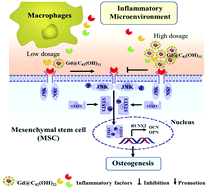当前位置:
X-MOL 学术
›
J. Mater. Chem. B
›
论文详情
Our official English website, www.x-mol.net, welcomes your
feedback! (Note: you will need to create a separate account there.)
Gd@C82(OH)22 harnesses inflammatory regeneration for osteogenesis of mesenchymal stem cells through JNK/STAT3 signaling pathway†
Journal of Materials Chemistry B ( IF 6.1 ) Pub Date : 2018-08-14 00:00:00 , DOI: 10.1039/c8tb01097h Jiao Lin 1, 2, 3, 4, 5 , Rong Cai 1, 2, 3, 4, 5 , Baoyun Sun 5, 6, 7, 8, 9 , Jinquan Dong 5, 6, 7, 8, 9 , Yuliang Zhao 1, 2, 3, 4, 5 , Qing Miao 1, 2, 3, 4, 5 , Chunying Chen 1, 2, 3, 4, 5
Journal of Materials Chemistry B ( IF 6.1 ) Pub Date : 2018-08-14 00:00:00 , DOI: 10.1039/c8tb01097h Jiao Lin 1, 2, 3, 4, 5 , Rong Cai 1, 2, 3, 4, 5 , Baoyun Sun 5, 6, 7, 8, 9 , Jinquan Dong 5, 6, 7, 8, 9 , Yuliang Zhao 1, 2, 3, 4, 5 , Qing Miao 1, 2, 3, 4, 5 , Chunying Chen 1, 2, 3, 4, 5
Affiliation

|
Tissue injuries are inevitably accompanied with immune responses. Understanding the effects of biomaterials on immunology regulation is critical for biomaterial development and tissue regeneration. Inflammatory cytokines secreted from macrophages promote the migration of mesenchymal stem cells (MSCs) to the damaged tissue sites and their subsequent participation in tissue repair. However, the effects of inflammatory cytokines caused by tissue injury on MSC behaviors urgently need to be revealed. Understanding and subsequently manipulating the interactions between immune cells and stem cells will provide us with new therapeutic strategies for tissue regeneration. Nanoparticles having immunomodulatory properties can modulate MSCs’ functions in the inflammatory microenvironment. In this study, an immunomodulatory nanoparticle Gd@C82(OH)22 was used to manipulate MSC differentiation in inflammatory microenvironment. The results suggested that macrophage-derived inflammation induces osteogenic differentiation of MSCs by activating the JNK/STAT3 pathway. Gd@C82(OH)22 modulates inflammation-induced differentiation of MSCs in a dose-dependent manner through the JNK/STAT3 pathway. Low concentration of Gd@C82(OH)22 facilitates osteogenesis and high concentration suppresses osteogenesis of hMSCs in the inflammatory microenvironment. This study suggests that Gd@C82(OH)22 can act as a promising immunomodulator to differentiate stem cells and improve stem cell-based therapeutic efficiency for biomedical regeneration in inflammatory microenvironments.
中文翻译:

的Gd @ C_ 82(OH)22个线束炎性再生通过JNK间充质干细胞的成骨/ STAT3信号传导途径†
组织损伤不可避免地伴有免疫反应。了解生物材料对免疫学调节的影响对于生物材料的发展和组织再生至关重要。巨噬细胞分泌的炎性细胞因子促进间充质干细胞(MSC)迁移到受损的组织部位,并随后参与组织修复。然而,迫切需要揭示由组织损伤引起的炎性细胞因子对MSC行为的影响。了解并随后操纵免疫细胞与干细胞之间的相互作用将为我们提供组织再生的新治疗策略。具有免疫调节特性的纳米粒子可以调节MSC在炎症微环境中的功能。在这项研究中,一种免疫调节纳米颗粒Gd @ C82(OH) 22用于控制炎症微环境中的MSC分化。结果表明巨噬细胞源性炎症通过激活JNK / STAT3途径诱导MSC的成骨分化。Gd @ C 82(OH) 22通过JNK / STAT3途径以剂量依赖性方式调节炎症诱导的MSC分化。在炎症微环境中,低浓度的Gd @ C 82(OH) 22促进成骨,而高浓度抑制hMSC的成骨。这项研究表明,Gd @ C 82(OH) 22 可以充当有希望的免疫调节剂,以分化干细胞并提高基于干细胞的治疗效率,用于炎症性微环境中的生物医学再生。
更新日期:2018-08-14
中文翻译:

的Gd @ C_ 82(OH)22个线束炎性再生通过JNK间充质干细胞的成骨/ STAT3信号传导途径†
组织损伤不可避免地伴有免疫反应。了解生物材料对免疫学调节的影响对于生物材料的发展和组织再生至关重要。巨噬细胞分泌的炎性细胞因子促进间充质干细胞(MSC)迁移到受损的组织部位,并随后参与组织修复。然而,迫切需要揭示由组织损伤引起的炎性细胞因子对MSC行为的影响。了解并随后操纵免疫细胞与干细胞之间的相互作用将为我们提供组织再生的新治疗策略。具有免疫调节特性的纳米粒子可以调节MSC在炎症微环境中的功能。在这项研究中,一种免疫调节纳米颗粒Gd @ C82(OH) 22用于控制炎症微环境中的MSC分化。结果表明巨噬细胞源性炎症通过激活JNK / STAT3途径诱导MSC的成骨分化。Gd @ C 82(OH) 22通过JNK / STAT3途径以剂量依赖性方式调节炎症诱导的MSC分化。在炎症微环境中,低浓度的Gd @ C 82(OH) 22促进成骨,而高浓度抑制hMSC的成骨。这项研究表明,Gd @ C 82(OH) 22 可以充当有希望的免疫调节剂,以分化干细胞并提高基于干细胞的治疗效率,用于炎症性微环境中的生物医学再生。


















































 京公网安备 11010802027423号
京公网安备 11010802027423号